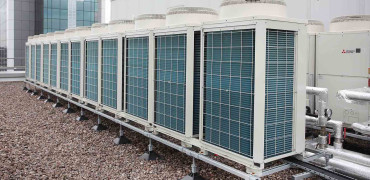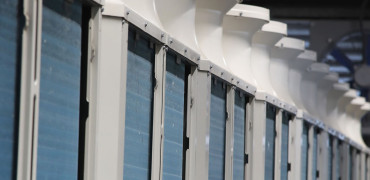As the CCC 2025 Report to Parliament puts the focus on heat pump expansion, Chris Newman points to the lack of strategy or support to decarbonise our commercial buildings.
The latest Climate Change Committee (CCC) Report to Parliament was published on 25th June 2025.
The good news is that the UK looks set to over-achieve the Fourth Carbon Budget that runs from 2023 to 2027. In fact, provisional 2024 emissions are below the annual average required by this budget.
The UK’s territorial emissions, including international aviation and shipping, were 413.7 MtCO2e in 2024, a 2.5% reduction from 2023.
This is the tenth consecutive year of sustained reduction in emissions, excluding the COVID-19 pandemic years 2020 and 2021. These reductions were driven by the UK’s electricity supply and industry sectors.
We need to be significantly under these levels to achieve that 2050 target
No time to rest
However, the Fourth Carbon Budget was set before the UK made its commitment to Net Zero 2050 back in 2019. This means that simply achieving the budget figures is not enough; we need to be significantly under these levels to achieve that 2050 target.
The CCC Report warns that this is no time to rest on our laurels. The government, says the CCC, must ‘stay the course.’
While this year’s Report shows progress, it also indicates that there is a narrowing range of focus for future emissions reductions. We can’t continue to rely on a greener electricity grid to get us over the line.
As the CCC points out, more than 80% of the required emissions savings between 2025 and 2030 must come from sectors other than our energy supply.
Heat pump adoption
One area that needs urgent action is in the scale up of the UK’s heat pump roll-out. The Report notes that it is one of the biggest hurdles to achieving that 2030 target. The CCC says that there are ‘Insufficient plans’ for this, with funding only covering a portion of what is needed to achieve the target.
Very specifically, the CCC envisions a UK green electricity grid that powers heat pumps for heating. Yet, decarbonising our heat is a major challenge. We have relied for so long on gas (or oil) for space heating and hot water that, frankly, we’re finding it hard to move on. But are we looking in all the right places to make that change?
While the CCC points to the need for the UK to drive domestic adoption of heat pumps, it also says that we must accelerate the electrification of industrial heat – and that there hasn’t been enough progress on policy in this area. This is an important point, as there are major gains in decarbonisation to be found in UK non-dwellings.
An overlooked opportunity
Unfortunately, this CCC Report makes only a passing mention of non-residential buildings – a paragraph or two on page 88 is all they are allocated. This is a huge oversight.
As I highlighted in my last blog, in the past ten years the use of gas in commercial buildings has only reduced by 2.5% - from 160 terawatt hours per year in 2022 to 156 TWh in 2022. That sort of progress is far too slow if we’re going to achieve the UK’s legal commitments and carbon budgets.
In theory, commercial buildings should be an easy target for fossil fuel use reduction. There are fewer buildings to tackle: 1.75 million compared to 18.7 million homes on the gas grid in England and Wales). Even if we leave aside industrial processes that require gas, there is a huge potential to decarbonise these buildings and make a significant contribution to Net Zero progress.
The CCC pointed out there are several ways in which government could encourage commercial building owners to make faster progress. For example, Minimum Energy Efficiency Standards (MEES) need to be updated with some urgency – the delay is only making energy efficiency updates more difficult as buildings age.
Commercial property owners and managers should be open to embracing the low-carbon heat future. Switching from fossil fuels will future-proof buildings against rising gas prices and makes spaces more cost-effective to heat or cool which is attractive to tenants and future buyers.
There are now so many flexible and efficient low-carbon options for heating and hot water systems, that there really is no excuse not to take a step to decarbonisation. Mitsubishi Electric’s range of heat pumps is used in offices, retail stores of all sizes, restaurants, hotels gyms, warehouses.
A lack of policy
Time and again, however, we come up against a lack of comprehensive policy focused on decarbonising the UK’s non-dwellings . The announcement that the government will no longer commit funding to the Public Sector Decarbonisation Scheme (or Salix scheme as it’s also known) is disappointing.
And we continue to wait for updates on the Minimum Energy Efficiency Standards (MEES) which would create a trigger point for many commercial building owners to make decisions to change their heating and hot water systems.
As the CCC Report highlights, the UK has ‘credible’ plans in place to meet 38% of its nationally determined contributions (NDC) to emissions reduction targets. But that leaves 62% of the emissions reductions required by 2030 with no plan – or at risk of failure.
The CCC highlights this lack of policy as a major hurdle and advises the government to address the gap urgently. It’s a call to action that I would also echo.
The government’s new Industrial Strategy says it’s time to decarbonise industry. But this leaves our commercial building stock out in the cold once more. There are critical emissions savings to be made by decarbonising commercial building heating systems with some relatively easy wins available from the application of low carbon heat pump technologies that have proved their performance in the market for many years now.
It's time to put commercial building owners and landlords under pressure to decarbonise – but also to provide the methodology, strategy and support mechanisms to help them do so. Unless we wring carbon reductions from every part of our economy, the 2050 goal will instead be an impossible dream.
Chris Newman is Zero Carbon Design Team Manager




